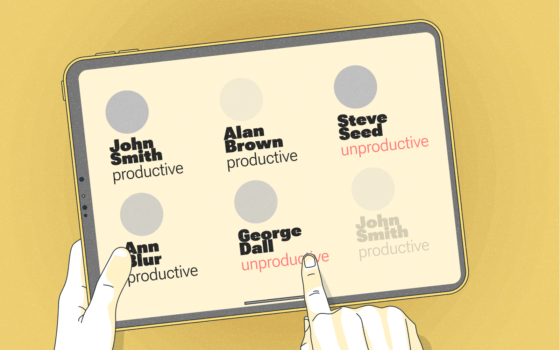Time Management Techniques: The Most Effective and Proven Tips to Boost Your Productivity
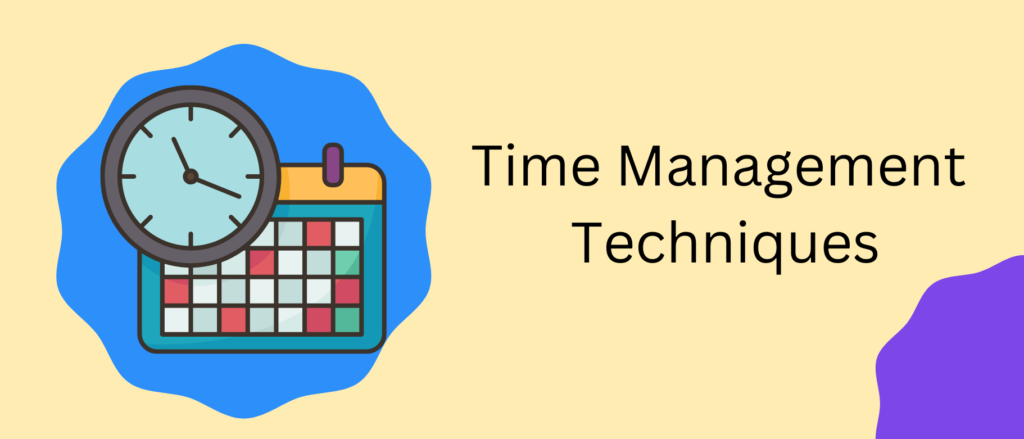
Time is the most precious commodity anyone has. We can’t get it back once it’s gone and we certainly can’t create more of it. That’s why it’s so important to use our time wisely and efficiently. There are a lot of different time management techniques out there. Some people swear by one method, while others find another to be more effective.
The truth is there is no single “right” way to manage your time. What works for one person might not work for another. In this blog post, we will be discussing some of the most effective and proven time management techniques for you to choose the one that will help you boost your productivity!
Stay tuned!
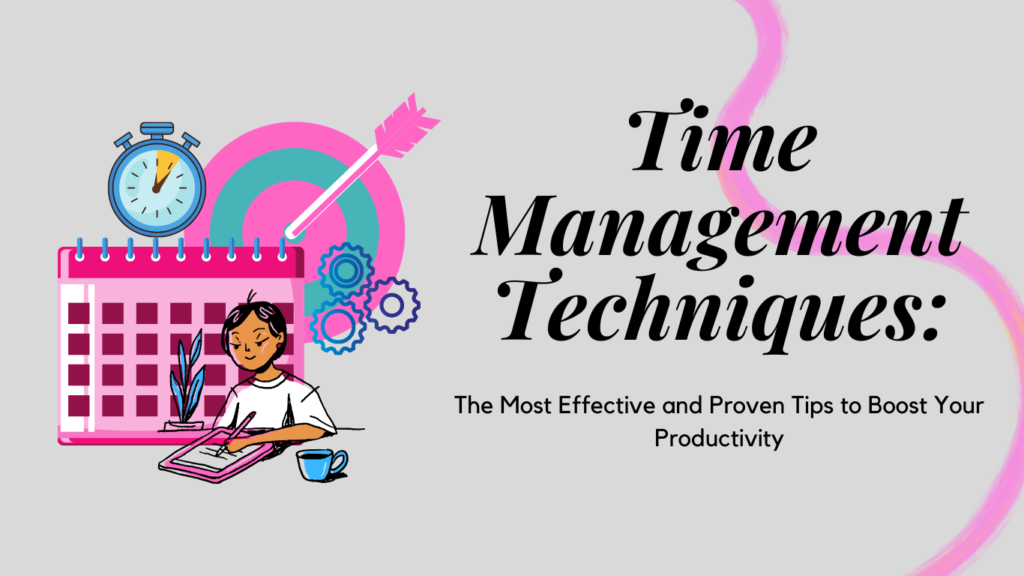
We know you have wasted time while looking for ways to not waste time, in fact, the average person has tried and/or uses 13 different time-management strategies. However, it’s interesting that only 11% of people use a time management tool. The rest is using the “deal with whatever comes” technique, which we can all agree it’s a bit sloppy.
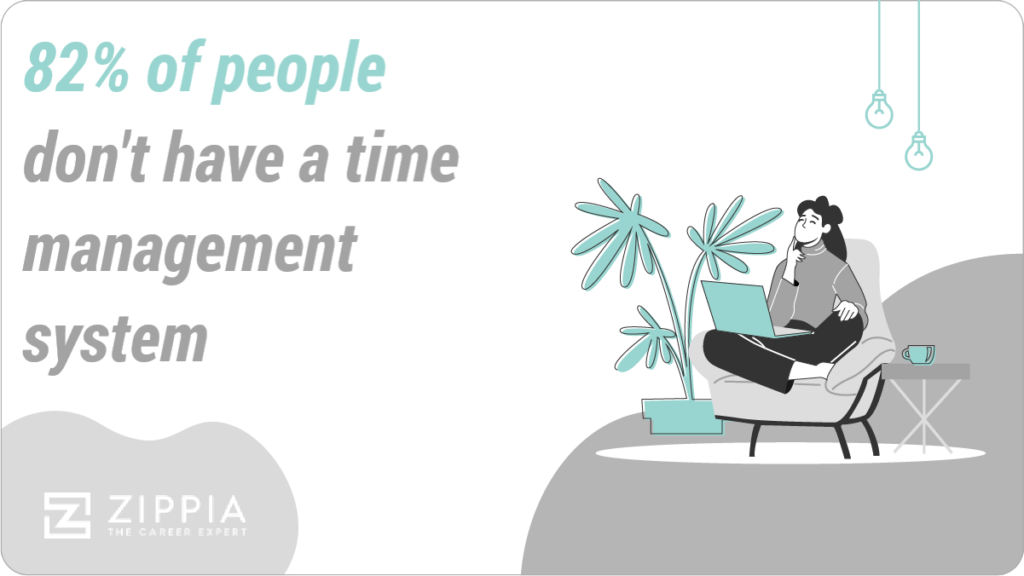
On the other hand, we have people using the oldie but goodie, to-do lists! The to-do list is a great way to get organized and see what needs to be done, but it’s not very effective if you don’t have a system in place for tackling those items, or if you are a freelancer with multiple clients. That’s where the time management techniques come in!
The Value of Time Management
Time management is not just about using your time wisely, it’s also about valuing your time. If you don’t value your time, you will never learn to use it wisely. Time management techniques are meant to help you optimize your time so that you can get more done in less time.
Time management is the process of planning and executing certain activities within a given timeframe
Time management is important for several reasons. For example, it can help you to get more done in a day. By understanding how much time you have available and planning your tasks accordingly, you can maximize your productivity and make the most of your time.
Greater Focus
Perhaps the most important is that it can help you to achieve greater focus. When you have a clear plan for how you will use your time, it is easier to stay on task and avoid distractions.
This can be especially helpful when working on challenging or complex projects. Time management techniques can help you to focus on one task at a time and get it done more quickly and efficiently.
Higher Levels of Productivity
Rome wasn’t built in a day and nor will your business. Time management is key to being productive. Time management skills are important as they give you the ability to complete tasks quickly, without compromising on quality.
Time management techniques can help you to work smarter, not harder. By learning how to better manage your time, you can boost your productivity and get more done in less time. This can free up some extra time that you can then use for other tasks or simply enjoy some well-earned rest and relaxation!
Routines and Schedules
Another benefit of time management is that it can help you to develop routines and schedules. This can make it easier to stick to a healthy lifestyle, as well as improve your productivity.
When you have a set routine, it is easier to get into the habit of working on certain tasks at certain times
These routines and schedules can also help to eliminate wasted time. For example, if you know that you have an hour available for work at a certain time, you can use that time more effectively by planning your tasks ahead.
This can help you to avoid procrastination and make better use of your time!

Reduce Stress
Yes, stress is the worst. When people feel like they are constantly behind schedule, they become tense and anxious, which can lead to a variety of health problems. Yet, you don’t have to live stressed out!
Time management can help to reduce stress by giving you a better sense of control over your day. When you feel like you are in control of your time, you will feel less stressed and more relaxed.
Better Work-Life Balance
Last but not least, time management can help you to achieve a better work-life balance. If you are constantly trying to cram more into your day than you have time for, it can be difficult to find time for the things that are important to you outside of work.
By learning how to manage your time effectively, you can make sure that you have time for your work, as well as your family, friends, and hobbies.
Time management is a skill that is worth learning! These are just a few of the many benefits that it can offer. If you want to boost your productivity and improve your work-life balance, start implementing some time management techniques into your routine.
Techniques to Help You Get Started with Time Management
Now that we’ve discussed the importance of time management, let’s take a look at some of the most effective and proven techniques that can help you boost your productivity!
Plan Ahead
Time management is all about using your time wisely, and that starts with planning ahead. When you know what you need to do and when you need to do it, you can make the most of your time.
That means:
- setting priorities
- being realistic about how long each task will take
- building in time for breaks so that you don’t burn out
- if something unexpected comes up, you can always adjust your plan accordingly
When you plan, you can avoid last-minute scrambling and make sure that you are using your time in the most efficient way possible. By knowing what tasks you need to complete and when you can avoid wasting time on things that are not important.

Set Time Limits
One way to improve time management skills is to set time limits. When you sit down to work on a task, set a timer for a specific amount of time and commit to working on that task until the timer goes off. This will help you to focus and ensure that you are making the most efficient use of your time.
A great tool to know what tasks are taking much of your time is Monitask. This software allows you to see, in real-time, which tasks are taking up most of your time. Monitask is also great for keeping track of deadlines and ensuring that you’re staying on top of your work. Check the Work Hour Tracker here.
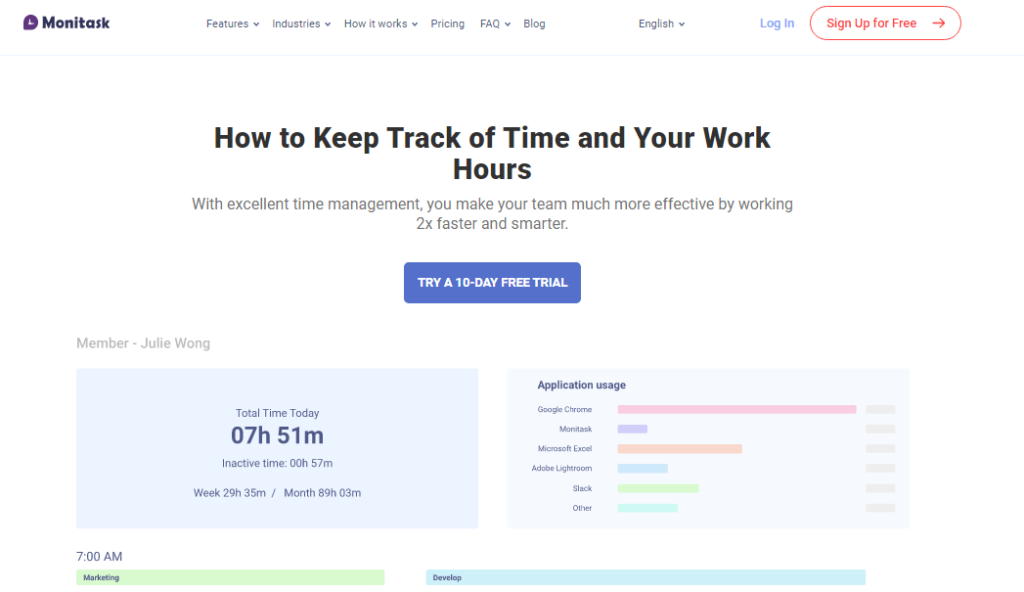
Setting time limits will help you to avoid getting bogged down in one task and forgetting about the others that you need to complete
When setting time limits, it’s important to be realistic. If you try to pack too much into a short time frame, you’ll likely end up feeling rushed and stressed. However, if you give yourself too much time, you may find yourself procrastinating and wasting time.
The key is to find a balance that works for you. Once you’ve set a time limit, stick to it. Turn off distractions and focus on the task at hand. If you finish early, use the extra time to take a break or work on another task.
Tackle the Most Important Tasks First
When you are trying to manage your time, it is important to prioritize your tasks. Not all tasks are created equal!
Some tasks are more important than others and should be given priority. These are typically the tasks that are deadline-driven or have a significant impact on your goals.
By tackling the most important tasks first, you can ensure that you are making the best use of your time. This will also help to reduce stress because you will not be worrying about deadlines as much.
Find Out Your Chronotype
Knowing when you are most productive during the day can help you make the most of your time. To find out your chronotype, answer the following questions:
- Are you a morning person or a night person?
- Do you have trouble waking up in the morning?
- Do you feel more energetic in the evening?
- Do you have trouble falling asleep at night?
A chronotype is an individual’s preference for the time of day they sleep. This could be due to their natural body clock or could be a result of their lifestyle choices
Based on your answers you find out yours. There are three main chronotypes: early bird, night owl, and somewhere in between.
- Early birds tend to wake up early and feel most productive in the morning.
- Night owls stay up late and feel most productive at night.
- Somewhere in “betweeners” don’t have a preference for either time of day. They’re about equally productive at both times.
Once you know your chronotype, you can plan your day around when you’re most productive!

Learn to Say No
Learning to say “no” is an important skill for anyone who wants to manage their time effectively. This is because saying “no” allows you to prioritize your time and energy on the things that are most important to you.
It can be difficult to say “no” at first, but it gets easier with practice. Here are some tips for learning to say “no”:
- Start by saying “no” to small requests. This will help you get used to the feeling of saying “no” and will also help you to assess how difficult it is to say “no” without offending someone.
- Don’t make excuses when you say “no.” Just state your decision firmly and move on.
- Be assertive when you say “no.” This means using affirmative statements such as “I’m sorry, but I can’t do that” rather than apologetic statements such as “I’m sorry, but I don’t think I can do that.”
Saying “no” is an essential skill for anyone who wants to manage their time effectively!
Be Aware of Distractions
According to estimates, distractions take up 28% of the regular workday and cost businesses more than $650 billion annually.
Email, social media, and even just simple day-to-day tasks can all derail your focus and cause you to lose precious time and money. By being aware of these potential distractions, you can work to avoid them and stay on track.
One way to combat distractions is to set aside specific times for checking email or social media. If you know that you tend to get drawn into these activities, schedule them for specific times of day and stick to that schedule. This will help you to avoid getting pulled away from what you’re supposed to be doing.
Now, these are very helpful tips, however, you can improve the results by following some established techniques for time management.
Pareto Principle
The Pareto Principle, also known as the 80/20 rule, states that 80% of results come from 20% of the effort. In other words, a small amount of effort can produce a large impact.
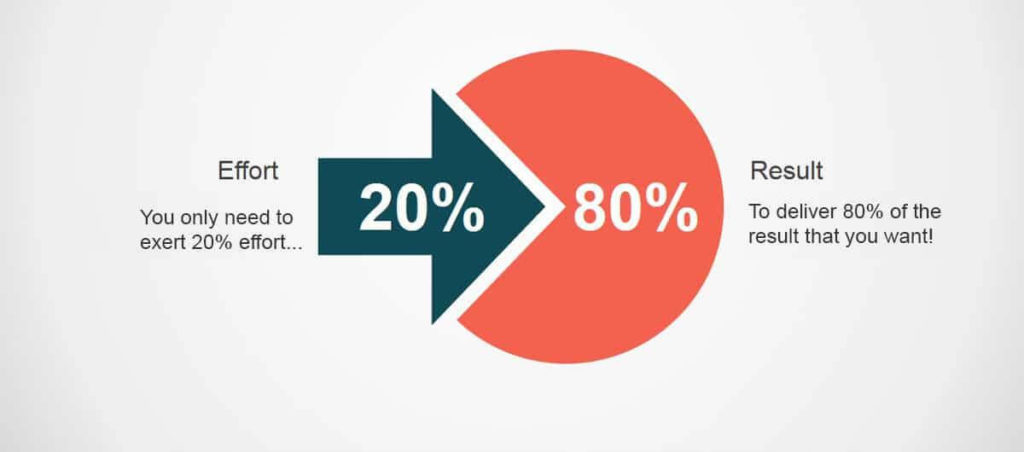
This principle can be applied to time management by focusing on the tasks that will have the biggest impact and saying no to everything else.
Of course, this is easier said than done! There are always going to be things that come up that we don’t want to say no to. However, if we want to make the most efficient use of our time, we need to learn to be selective about what we say yes to.
The Pomodoro Technique
The Pomodoro Technique is a popular time management method that was created by Francesco Cirillo in the 1980s. The technique is based on the idea that if we break down into manageable chunks and work on one task for a set of time, we can be more productive overall.
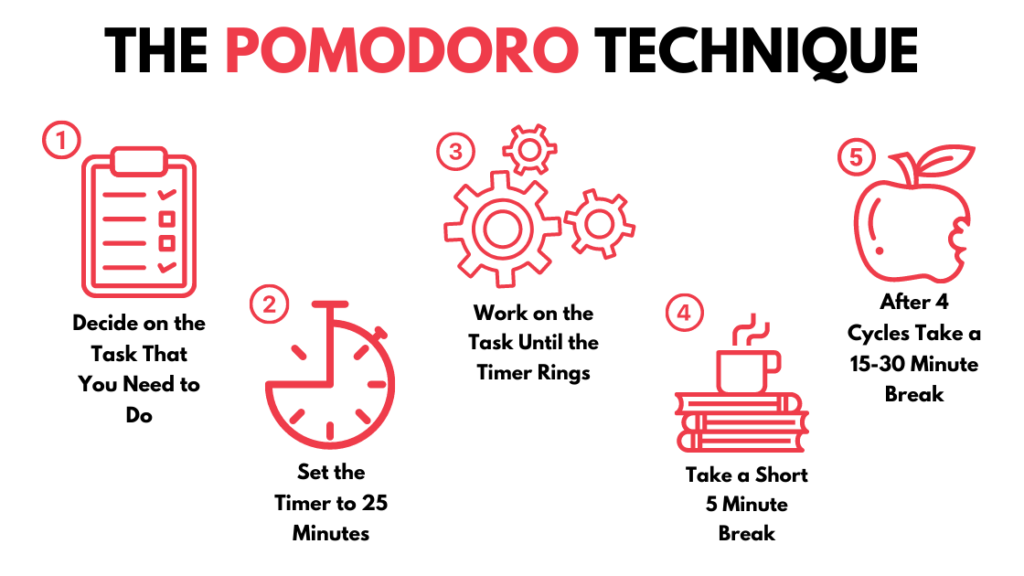
The Pomodoro Technique is named after the tomato-shaped kitchen timer that Cirillo used when he developed the technique. The basic idea is to work on one task for 25 minutes and then take a five-minute break.
Timeboxing
This is a similar technique to the Pomodoro Technique, but instead of working on one task for a set time, you work on multiple tasks for a set time.

For example, you might spend the first hour of your day working on email, the second hour working on a project, and the third hour working on social media.
The key to making this technique work is to be strict about the amount of time you spend on each task
Timeboxing is a great way to boost your productivity because it helps you to focus on one task at a time and prevents you from getting overwhelmed by your to-do list.
Both the Pomodoro Technique and Timeboxing are effective methods for managing your time and boosting your productivity. However, it’s important to find what works best for you.
Take Time for Your Health
One last important tip is to take care of yourself both physically and mentally. When you are feeling good better you feel, the more productive you will be.
Make sure to schedule time for exercise, healthy meals, and relaxation. This will help you to avoid burnout and maintain a high level of productivity.
Final Considerations
There are a lot of different time management techniques out there, and it can be tough to determine which ones will work best for you.
By following the tips in this blog post, you will be on your way to becoming a time management pro! Just remember to find what works best for you and to be patient as you develop new habits. Time management is a skill that takes time and practice to perfect.
Don’t forget to share our article with your co-workers, friends, or even your boss!
-The Monitask Team
